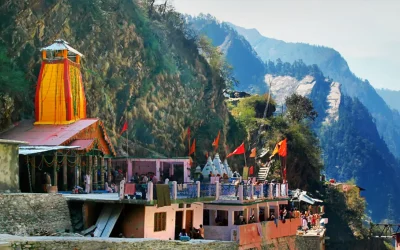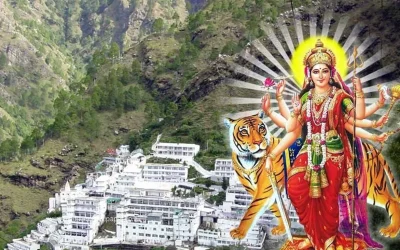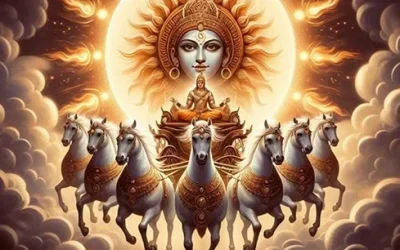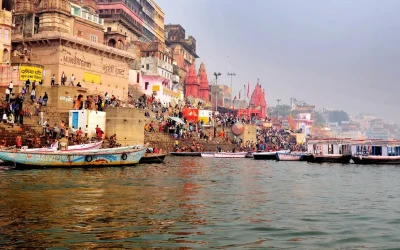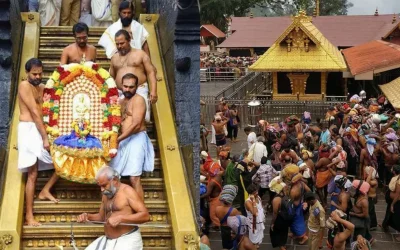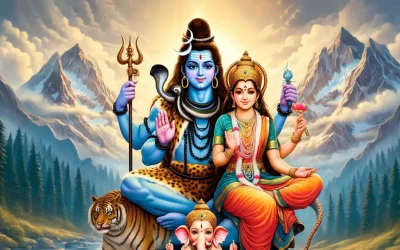A Spiritual Journey into Kanchipuram’s Sacred Heart
Sri Kanchi Kamakshi Amman Temple
Have you ever been to a place where the place speaks of ancient history, myth, and spirituality? And they seem to blend in so seamlessly that you can feel the presence of the divine energy. This is what makes Sri Kanchi Kamakshi Amman Temple in Kanchipuram, Tamil Nadu, a place that attracts. It is known as the most important center for worshipping the goddess Shakti. This temple is where Goddess Kamakshi resides in all her grace. She is the embodiment of divine love and power.
As you walk through its sacred halls, you’ll feel the presence of centuries of devotion, artistry, and tradition radiating from the temple’s heart, where the goddess sits in a lotus position.
The Three Powerful Temples for Goddess Shakti
In India, there are three cities where Goddess Shakti is worshipped, and they are in Kanchipuram, Madurai, and Kashi. Among them, Kanchipuram holds the highest regard. Here, Goddess Kamakshi is worshipped, while in Madurai, it is Goddess Meenakshi, and in Kashi, Goddess Visalakshi.
The Sri Kanchi Kamakshi Amman Temple stands as a prominent Shakti Peetha (a sacred seat of power). It is said that Goddess Kamakshi rules here as an incarnation of Parasakti, with Saraswati (goddess of knowledge) and Parvati (goddess of power) as her eyes. This sacred presence makes the temple not just a place of worship but a vital link to the ancient spiritual traditions of India.
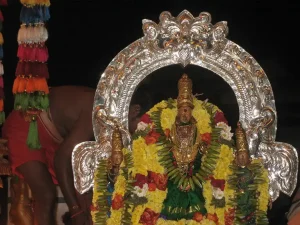
The Divine Legacy of Kanchipuram: Origin and Historical Roots
Kanchipuram has been a renowned centre for religion, culture, and education since the ancient Sangam period, as mentioned in the Tamil literary classic Perunaraatrupadai. As we see it today, the temple was built by King Thondaiman Ilandiraiyan of the Pallava dynasty, adding a layer of historical significance that connects us to the early centuries of the Common Era.
However, the spiritual journey of this temple took a profound turn in the 8th century when the great Vedic scholar Adi Sankaracharya visited. Within the shrine, he established the Sri Chakra, a powerful symbol of divine energy. This act transformed the deity Kamakshi from her fierce form (Ugra Swaroopini) to a more benevolent and peaceful form (Shanta Swaroopini). Since then, Kamakshi has been worshipped as a deity of tranquillity and compassion, watching over Kanchipuram’s people and pilgrims alike.
Legends and Folklore: Goddess Kamakshi’s Sacred Penance
According to local legends, the tale of Goddess Kamakshi’s love and devotion is as compelling as the structure that houses her. It is said that Kamakshi performed intense penance in a firepit to win the favour of Lord Shiva. Moved by her devotion, Shiva appeared before her and agreed to marry her, thus merging their divine energies and blessing the land of Kanchipuram with prosperity.
The legend also says that Kamakshi initially existed in her fierce Ugra form. Sensing the overwhelming power, Adi Sankaracharya installed the Sri Chakra to soften her energy, requesting her to remain within the temple premises to benefit her devotees. As a symbol of this promise, every time Kamakshi is taken out for a procession, she seeks permission from Adi Sankaracharya at his shrine in the temple’s inner prakaram. This ritual continues to this day.
The iconography of Goddess Kamakshi: The Lotus-Seated Divine
One of the most captivating aspects of this temple is the image of Goddess Kamakshi in Padmasana, a lotus-seated posture symbolizing purity, wisdom, and spiritual awakening. In her four hands, she holds significant symbols: a sugarcane bow representing desire, a lotus flower symbolizing creation, a parrot that represents beauty, and Pasha-Ankusha (noose and goad), signifying control over one’s senses.
This divine imagery is further accentuated by a crescent moon (Chandra Prabhai) on her forehead, symbolizing her calm and nurturing nature. Seen as the Parabrahma Swaroopini, Kamakshi is considered to embody the combined power of the Hindu trinity—Brahma (creator), Vishnu (protector), and Shiva (destroyer)—making her presence one of profound completeness.
Architectural Marvels of the Temple Complex
The Kanchi Kamakshi Amman Temple covers an area of about 5 acres, featuring beautiful architecture with detailed carvings, halls, and the temple tank. The gold-plated vimanam (tower) of the sanctum adds to the splendour, with intricately carved pillars, mandapams (halls), and the sacred Pushkarini (temple tank) spread across the outer precincts.
As you move through the 100-pillared hall of the Dwajaarohana Dwajaarohana Mandapam, you will be awestruck by the fine details on every pillar and wall. The temple tank, surrounded by images of Lord Vishnu in his Ninraan (standing), Irundaan (sitting), and Kidandaan (reclining) forms adds to the sanctity of the space. There’s even an art gallery offering glimpses into Adi Sankaracharya’s history.
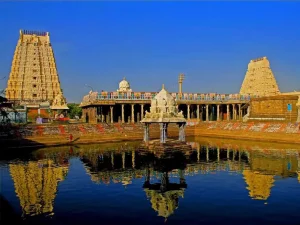
Noteworthy Shrines Inside
Apart from the main shrine, the temple houses smaller shrines dedicated to Ardhanareshwarar, Soundaryalakshmi, Kalva Perumal, and Varaahi. These shrines, each with unique deities and symbolic meanings, contribute to the temple’s rich tapestry of faith and tradition.
Celebrations and Rituals at Kamakshi Temple
The Kamakshi Amman Temple is bustling with religious fervour throughout the year. Daily rituals are performed four times a day, but it is during the annual festival in Maasi (February-March) that the temple truly comes alive. Among the various events, the Silver Chariot Festival on the 7th day is a sight to behold, drawing crowds of devotees eager to receive the goddess’s blessings.
Additional festivals such as Navaratri, Aadi, Aippasi Pooram, Sankara Jayanthi, and Vaikasi Vasanta Utsavam keep the temple vibrant year-round. On Fridays at 7 pm, the Golden Chariot is taken in a procession around the temple, filling the air with the sounds of devotional music and the scent of flowers, creating a deeply spiritual atmosphere.
Embrace the Divine at Sri Kanchi Kamakshi Amman Temple
Sri Kanchi Kamakshi Amman Temple is a holy site that gives an experience of the divine energy. The ancient architecture, rituals, and festivals just add more for a deeper spiritual experience.
So, next time you find yourself in Tamil Nadu, make the time to visit the sacred world of Goddess Kamakshi in Kanchipuram—a place where history, devotion, and divine energy await to inspire you.

